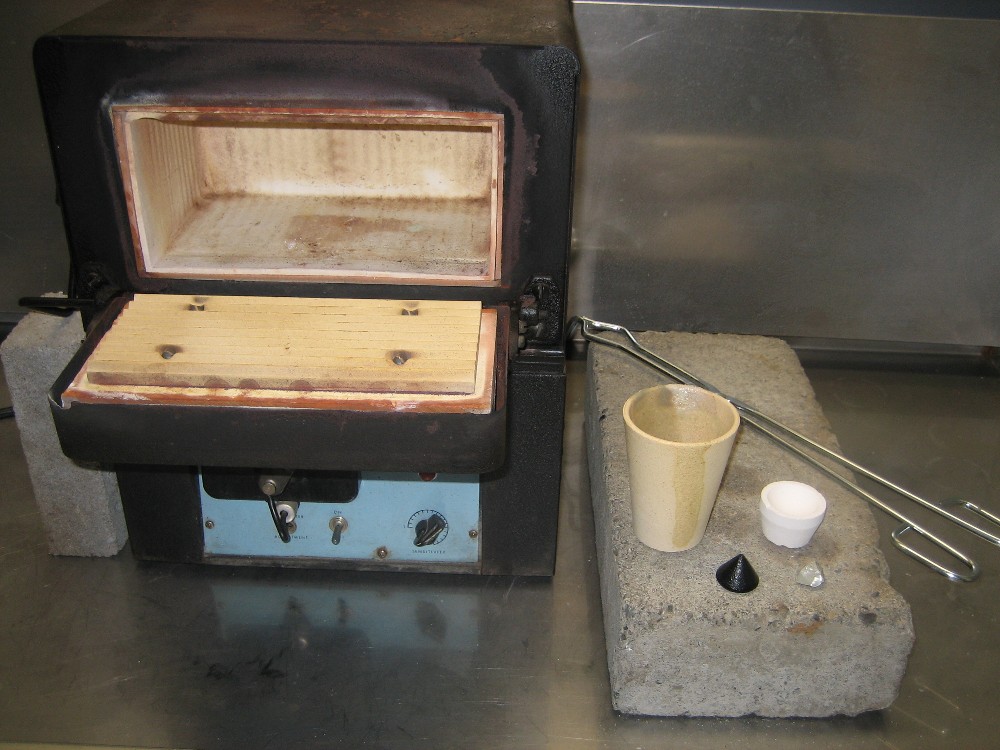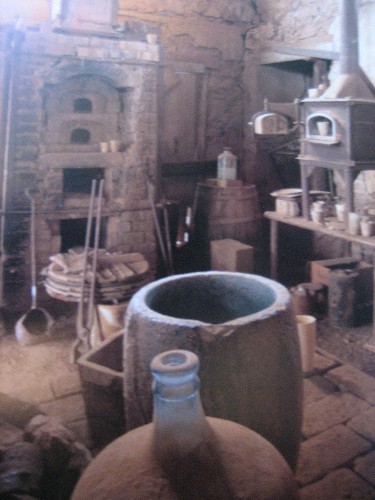Magpie
lab constructor
    
Posts: 5939
Registered: 1-11-2003
Location: USA
Member Is Offline
Mood: Chemistry: the subtle science.
|
|
fire assay
This is a specialized analysis in the field of metallurgy. I'm not sure where it belongs but since it requires a furnace and crucibles I placed it
here.
My ore looks like silica and indeed when I made a test for reducing power it had none. For the fusion I ended up with a flux made of Na2CO3, PbO, and
Na2B4O7. For the reductant I used wheat flour. One quarter inch of NaCl was used for a cover.
Today I cupeled the lead prill and was thereby presented with a dore bead weighing 3 mg for the 15g ore charge. Therefore, my ore is loaded at about
6oz/ton of Au/Ag/PGM.
The next step is to dissolve out the Ag and determine the gold content. I'll attach some pictures if there is any interest.
The single most important condition for a successful synthesis is good mixing - Nicodem
|
|
|
Fleaker
International Hazard
    
Posts: 1252
Registered: 19-6-2005
Member Is Offline
Mood: nucleophilic
|
|
I am interested to hear more about it. So you've finished the cupellation then I take it and now you intend to part the remaining lead and silver from
the more noble things (Pt and others). Keep in mind that you should check for palladium (DMG works) and checking for silver is easy enough with table
salt. Just give it an ammonia wash to check to see if the silver complexes.
If you don't mind me asking, where'd the ore come from?
P.S. Avoid the fumes from the lead.
P.P.S. What type of cupel are you using, bone ash or magnesia. Both are available at lmine (just google legend mining, and you will be quite happy
with this store). Rather interesting that they sell NaCN by the kilo there, along with large quantities of mineral acids, bismuth, lead, silver, etc.
BTW, Ammen's book is rather nice. I take it you are reading from the book on refining.
[Edited on 7-11-2006 by Fleaker]
Neither flask nor beaker.
"Kid, you don't even know just what you don't know. "
--The Dark Lord Sauron
|
|
|
Magpie
lab constructor
    
Posts: 5939
Registered: 1-11-2003
Location: USA
Member Is Offline
Mood: Chemistry: the subtle science.
|
|
I'm trying to follow the directions of Ammen's book and will use that for parting the gold. However, I did find that his recommended cupelation
temperature of 850C was too low. I used 1000C today then cut back a bit when I noted that the cupel had "opened." This seemed to work well.
The ore is from central Idaho.
The single most important condition for a successful synthesis is good mixing - Nicodem
|
|
|
Magpie
lab constructor
    
Posts: 5939
Registered: 1-11-2003
Location: USA
Member Is Offline
Mood: Chemistry: the subtle science.
|
|
Ah, yes the lead fumes. I did the furnace work in my hood. But it still bothers me to generate them. For that reason I wish I had the bismuth
trioxide instead of PbO (litharge). I don't plan on doing many of these.
I used bone ash cupels. The attached picture shows my equipment. The Jelenko furnace is an old dental (I think) furnace that I picked up on eBay for
less than $200, IIRC. I did get the rest of the supplies from Legend Mine as you indicated. I had to buy a case of clay crucibles but was able to
buy just a few cupels, at that time.
The little cone in the picture is the black glass produced when I did the reducing power (RP) determination for the ore. The lead buttons (not shown)
are the same shape and size. The piece of grey glass is a piece of slag from the assay fusion. Not shown is a cast iron mold used to get the cone
shapes from the fusion pour.
Yes, I'm using Ammen's Recovery and Refinning of Precious Metals. It's a fun read and oriented towards doing instead of theory. I called
Ammen with a question a couple years ago. He's old and crusty but has a good (and bawdy) sense of humor. 
I would show a picture of the dore bead but it is very small, with diameter <1mm.

The single most important condition for a successful synthesis is good mixing - Nicodem
|
|
|
neutrino
International Hazard
    
Posts: 1583
Registered: 20-8-2004
Location: USA
Member Is Offline
Mood: oscillating
|
|
On the subject of fire assays and prospecting in general, this site may be of help.
|
|
|
Fleaker
International Hazard
    
Posts: 1252
Registered: 19-6-2005
Member Is Offline
Mood: nucleophilic
|
|
I am quite familiar with that site and it has (for the most part) rather good information. A few things I don't see working well, but the guy did have
experience running his own assay lab. I heard from a friend who knew him that he passed away last year. IIRC I think he was bitten by a snake while
in the jungle prospecting.
Neither flask nor beaker.
"Kid, you don't even know just what you don't know. "
--The Dark Lord Sauron
|
|
|
Eclectic
National Hazard
   
Posts: 899
Registered: 14-11-2004
Member Is Offline
Mood: Obsessive
|
|
Quick, back the site up before it goes away.
|
|
|
neutrino
International Hazard
    
Posts: 1583
Registered: 20-8-2004
Location: USA
Member Is Offline
Mood: oscillating
|
|
I uploaded a full copy to axehandle's FTP ages ago, so don't worry. It's under Basement Chemistry for the Prospector or something along those lines.
The page seems different than it was a few months ago. The top frame and the links page were added, I think. It seems that someone is still
maintaining it.
|
|
|
Magpie
lab constructor
    
Posts: 5939
Registered: 1-11-2003
Location: USA
Member Is Offline
Mood: Chemistry: the subtle science.
|
|
For the mining history buffs here is a picture of the assay office at Vulture, Arizona, where $200 million in gold was extracted.
Is this possibly a part of vulture's worldwide empire? 

The single most important condition for a successful synthesis is good mixing - Nicodem
|
|
|
Texium
|
Thread Moved
19-11-2023 at 11:33 |